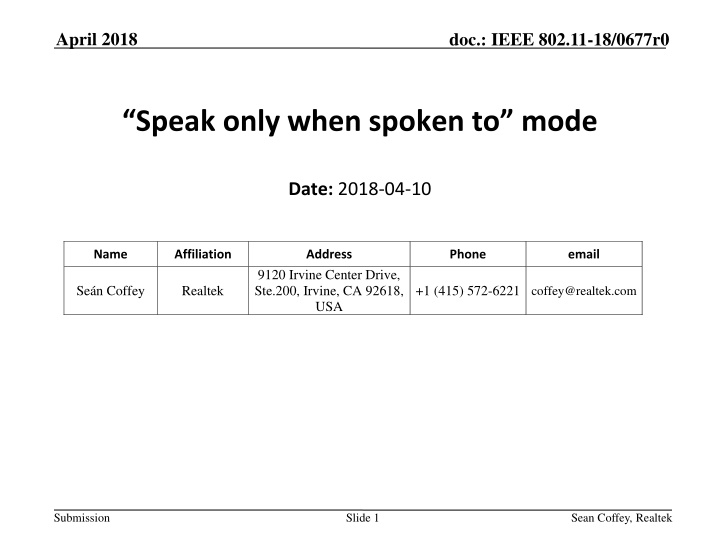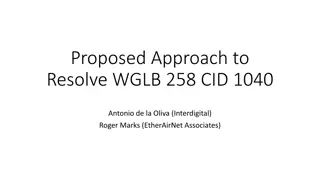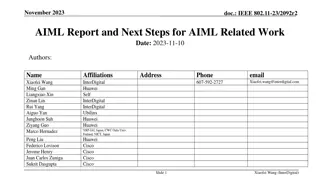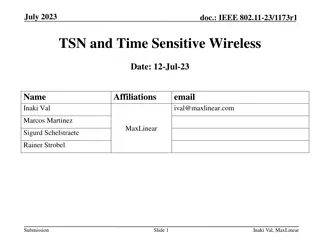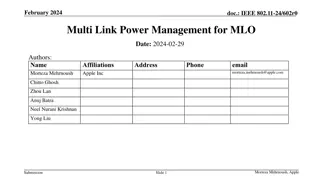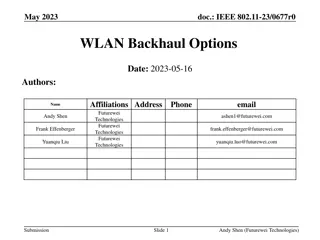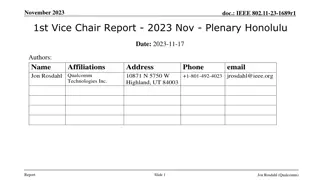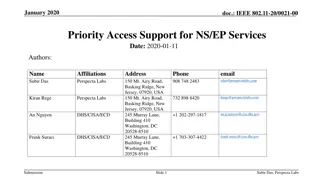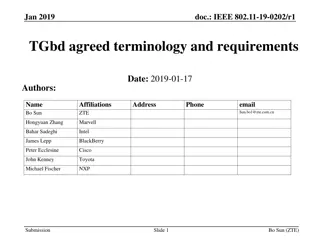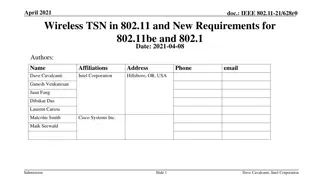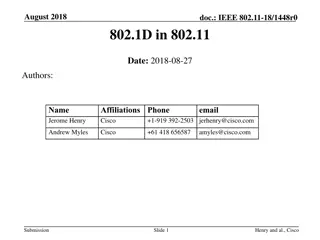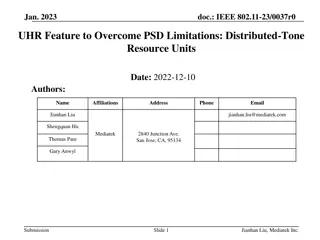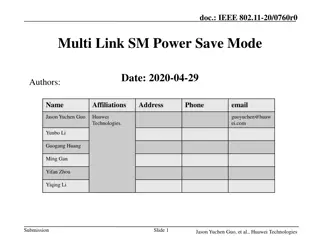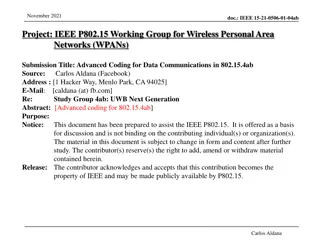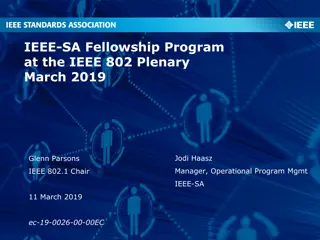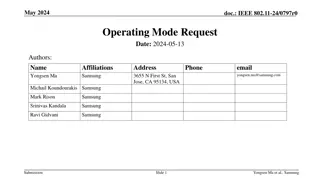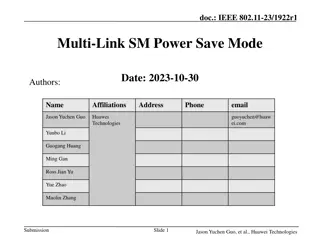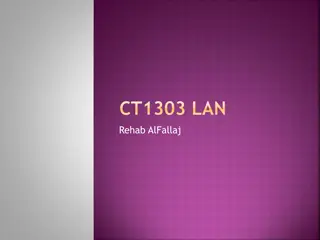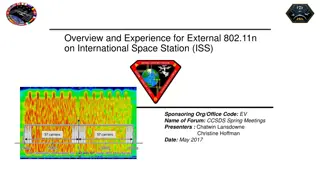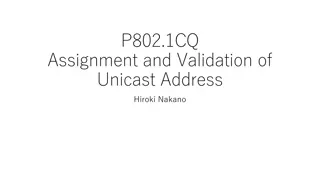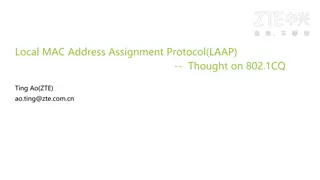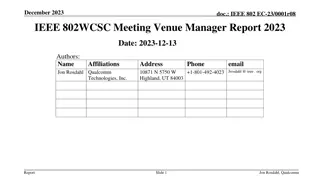IEEE 802.11-18/0677r0: Speak-Only-When-Spoken-To Mode in Wireless Networking
This document discusses the implementation of a speak-only-when-spoken-to mode in IEEE 802.11-18/0677r0 for managing various devices within wireless networks. It highlights the benefits of this mode for maintaining throughput efficiency and coexistence, especially in scenarios involving 11b-only devices and IoT-oriented applications. Additionally, it explores how this mode can optimize uplink transmissions and adapt CCA thresholds dynamically. The presentation emphasizes the practical advantages and use cases of this operational mode.
Download Presentation

Please find below an Image/Link to download the presentation.
The content on the website is provided AS IS for your information and personal use only. It may not be sold, licensed, or shared on other websites without obtaining consent from the author.If you encounter any issues during the download, it is possible that the publisher has removed the file from their server.
You are allowed to download the files provided on this website for personal or commercial use, subject to the condition that they are used lawfully. All files are the property of their respective owners.
The content on the website is provided AS IS for your information and personal use only. It may not be sold, licensed, or shared on other websites without obtaining consent from the author.
E N D
Presentation Transcript
April 2018 doc.: IEEE 802.11-18/0677r0 Speak only when spoken to mode Date: 2018-04-10 Name Affiliation Address Phone email 9120 Irvine Center Drive, Ste.200, Irvine, CA 92618, USA Se n Coffey Realtek +1 (415) 572-6221 coffey@realtek.com Submission Slide 1 Sean Coffey, Realtek
April 2018 doc.: IEEE 802.11-18/0677r0 Abstract It would be very useful for at least one purpose (managing 11b- only devices within g/n/ax BSSs), and useful for other purposes, to have a speak only when spoken to mode of operation. This presentation describes some of the motivating uses. CIDs addressed: 1589 Submission Slide 2 Sean Coffey, Realtek
April 2018 doc.: IEEE 802.11-18/0677r0 A primary use case 2.4GHz devices from 11g on must use single-tone protection mechanisms when 11b-only (NonERP) devices are associated Cf. 10.27.2 There are relatively few currently deployed 11b-only devices But for IoT devices, this is a desirable design option It is commonly asserted that omitting OFDM modes entirely enables low power consumption, and the use of coin cell batteries And it only takes one such device in a BSS to trigger the protection mode requirement Some common estimates are that a single 11b-only device associating can cause an immediate 30% drop in BSS throughput even if that device transmits only rarely Submission Slide 3 Sean Coffey, Realtek
April 2018 doc.: IEEE 802.11-18/0677r0 A primary use case II The speak-only-when-spoken-to mode would provide a simple way of avoiding the throughput penalty, while still preserving the same level of coexistence: The (new, IoT-oriented) 11b-only non-AP STA could associate and enter speak-only-when-spoken-to mode: the STA would only be able to transmit when permitted (poll, TWT, RAW, or other) So no need for the AP to use single-tone protection mechanisms, on behalf of that STA, at any other time More generally, this provides a way of managing multiple PHYs in future: no need to have longer and longer preambles incorporating every previous generation Submission Slide 4 Sean Coffey, Realtek
April 2018 doc.: IEEE 802.11-18/0677r0 A second use case* With deployed APs implementing ever-greater numbers of spatial streams, uplink transmissions can be received successfully at correspondingly lower received signal levels However, there s a catch: the AP has to set its CCA threshold at a correspondingly low level; and setting the level too low will cause deferral for OBSS traffic too often The speak-only-when-spoken-to mode provides a simple way of optimizing operation: the AP can modify its CCA threshold dynamically low levels when polling devices for which that is necessary * If there were only one use, it would be reasonable to tie the mode to that one case Submission Slide 5 Sean Coffey, Realtek
April 2018 doc.: IEEE 802.11-18/0677r0 Discussion There are many possibilities for the enabling protocol: Setup & teardown to negotiate how often the STA needs to be polled, renegotiate, allow interrupts, etc. Mandatory or optional (or both as variants) Submission Slide 6 Sean Coffey, Realtek
April 2018 doc.: IEEE 802.11-18/0677r0 Straw poll Do you support (in principle) adding definitions and supporting protocol for speak-only-when-spoken-to mode? Yes No Need more detail but generally supportive Need more detail but generally not supportive No opinion Submission Slide 7 Sean Coffey, Realtek
